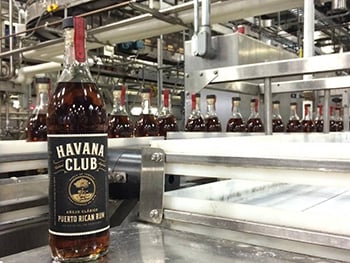It has been quite some time since real pirates plied the waters of the Caribbean seeking valuable treasure, high-spirited adventure, and wooden casks of rum, but the recent thaw in U.S. relations with the Cuban government has reignited a decades old trademark battle over the “HAVANA CLUB” trademark for rum.
Currently, Bacardi Ltd. sells rum in the U.S. under the HAVANA CLUB name but its right to the trademark has been called into question by Pernod Ricard SA, a Paris-based distiller that is a partner with the Cuban government in a joint venture known as Havana Club International. Bacardi, founded by one of Cuba’s oldest families in 1862, claims priority of rights to the mark through the Arechabalas family, who originally founded Havana Club, registered the trademark in the United States and then sold those rights to Bacardi. Both families fled the country in 1960 when Fidel Castro’s revolutionary government nationalized the island’s distilleries. Bacardi has sold rum made in Puerto Rico under the HAVANA CLUB trademark almost continuously since 1995.
Pernod is investing millions of dollars to expand its Cuban operations in anticipation of the U.S. market being reopened to Cuban imports, including Cuban rum. Pernod’s claim to the mark is based on a 1995 agreement with the Cuban government to distill rum in Cuba and, eventually, sell it in other countries, including the U.S., where the joint venture had determined the original Arechabalas trademark registration had lapsed in 1973. Now that the U.S. government has reestablished diplomatic ties with Cuban and has eased commercial restrictions on the Caribbean nation, Havana Club International is eager to capitalize on the thirsty U.S. market.
Bacardi and the Cuban government have already sparred over these trademark rights. Bacardi has been holding onto pending federal registrations with the U.S. Patent and Trademark Office since 1994 (and another in 1999) while it fought for registration. But in January of this year, the P.T.O. granted an unusual Petition to the Director which resulted in the renewal of Cuban government trademark registrations that had been suspended for the duration of the commercial embargo against Cuba imposed by the U.S. in the 1960’s. This unexpected victory has emboldened Cuba and Pernod to continue the fight.
Now, the matter is pending in the U.S. District Court in Washington, D.C. where Bacardi is seeking to have Cuba’s trademark registration canceled. In fact, both sides have argued that the other abandoned use of the HAVANA CLUB trademark at one time or another and that because of the abandonment their own priority should be recognized. Unfortunately for one of the combatants, this battle is not likely to end until it has been forced to “walk the plank” and stop selling rum under the HAVANA CLUB mark.
Why It Matters. Consistent, continuous use of a trademark is one of the most important ways to enhance the value of a mark and it is essential when a trademark owner seeks to enforce it against an infringing competitor. In fact, continuous use is a key factor in maintaining a trademark registration in the United States and in renewing the registration every ten years. Without continuous use, the P.T.O. will consider a trademark abandoned and will deny renewal.

